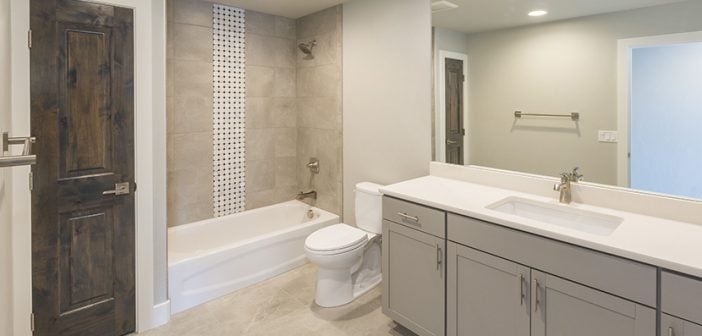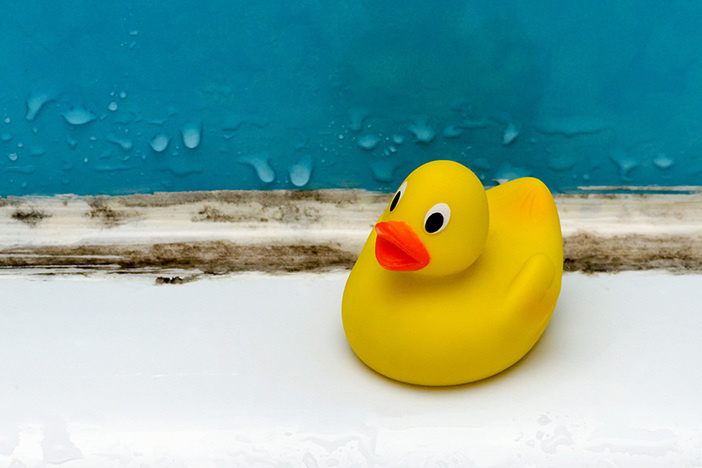As a lot of real estate investors already know (and newbies may have heard), some tenants are very hard on rental properties. Over the years, I have had to replace miles of carpet—and in the bathroom, even a smashed toilet or two.

Want more articles like this?
Create an account today to get BiggerPocket's best blog articles delivered to your inbox
Sign up for freeFor me, one of the biggest challenges is keeping the bathroom as carefree as possible. We all know what goes on in bathrooms and what kind of extra care they need. So, here is a list of things that I have learned over the years that make turnover quick and cheap.
Dos & Don’ts When Redoing Rental Property Bathrooms
1. Ditch the cheap shower surround.
Please don’t buy that cheap five-piece shower surround that you saw at Home Depot or Lowe’s. I promise you it is cheap for a reason and will only cause problems.
First of all, caulk in a bathtub will never last. From mold to people picking at it, caulk will need touched up at least once per year. A typical five-piece surround is held together with glue and caulk, and without maintenance, it will fall apart and just cause you more problems.
Related: 6 Bathroom Remodel Tips Every House Flipper Should Know
Instead, go ahead with a two-piece surround or even a tile surround. Yes, you will have to caulk in some places especially around the tub/wall), but it will be very minimal to what a five-piece surround takes.
I only put two-piece surrounds in my full gut rehabs. They are my favorite, because they are cheap and snap together higher, which better protects from splashing water. Plus, they look so much nicer than a bunch of panels glued to the wall.
For my existing bathtubs, I usually do a tile surround. This not only looks nice but also lasts forever.
2. Get a good exhaust fan.
Even if your bathroom has a window, I would still suggest this. Moisture in a bathroom is killer. If you walk into a bathroom and see peeling paint on the ceiling, you know that room was not ventilated while showers were taken.
I have all my exhaust fans wired to the same switch as the light so that the fan has to be turned on. (Go ahead and spend the few extra dollars for the quieter fan; then the tenant won’t notice it as much.) Turning on the fan will also help eliminate bathroom odors and odors from harmful bathroom cleaning chemicals.
Pro tip: I always have cleaning the exhaust fan on my cleaning crew’s checklist during turnover. Tenants won’t know there is a problem with the fan until it is squealing. And by this time, it is too late.

3. Use sheet vinyl or luxury vinyl tile.
Please don’t use snap together laminate or carpet. Don’t be that guy or girl who likes that it’s cheap, thinks that it’s trendy, or is just plain lazy and puts that stuff in a bathroom. It’s not water resistant, and it’ll just cause a headache of problems.
I go with either sheet vinyl glued down or LVT because of the waterproofing capabilities. I have used ceramic tile in the past but have since steered away from it. The cost and the grout turned me off. (Yes, the grout. I have had ceramic tile grout lines that were so soaked in urine that we couldn’t get the smell out.)
Related: 4 Types of Renovations That Are Better Left Undone
Although I love the look of ceramic tile, vinyl is my go-to in a rental bathroom. Of course, this varies among different classes of properties. So, make sure you do your research before installing cheaper flooring.
4. Beware of the towel bar.
This has to be the number one thing in rentals that gets destroyed. Do some people think this is a pull-up bar?
Most towel bars are 24 inches, but as we both know, most studs are 16 inches on center. Using that little plastic drywall insert is a joke—plus, nobody uses it.
What we have started doing is one of two things. The first thing we like to do is cut the towel bar down to 16 inches so that the mounting brackets will screw right to the studs and not just drywall.
If this is not possible, we go and buy butterfly nuts and bolts to attach the mount that can’t be screwed to a stud. These are those spring-loaded clips that you collapse and push into a hole in the drywall. When you screw them tighter, they pull against the back of the drywall. They are not as good as screwing to a stud but work a lot better than those plastic inserts.
No matter what you choose to do to your rental property’s bathroom, just make sure it looks good and can hold up to tenants’ wear and tear. Remember, turnover is one of your most expensive costs, so try to eliminate downtime and repair costs by doing it right the first time.
Do you have any tips and tricks when it comes to renovating or maintaining rental property bathrooms?
Share below with a comment!


